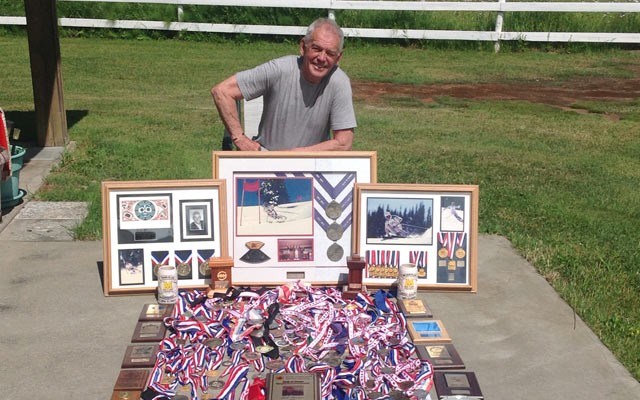June 27 was Bob Switzer's 80th birthday, but he was the one giving out the gifts.
Switzer, who was inducted into the Canadian Masters Hall of Fame in 2007, came to the Whistler Museum with a bin full of medals and other memorabilia totalling roughly 500 pieces.
Switzer recently relocated to Pemberton after living in a condo in the Benchlands since that neighbourhood's infancy. He's kept a few pieces, roughly 20 to 25 for himself, but the rest came to the museum.
"I feel really good about it. I'm not really going to be racing anymore. So it's a nice feeling to know I've done the whole circle here, and I'm still here having a good time and enjoying it," he said. "It's like scrubbing the space and making room for something else to happen."
Collections manager Alyssa Bruijns said while she'd chatted with Switzer months ago about potentially taking in a lifetime's worth of awards, it came as a surprise when he showed up at the door.
"I had no idea he was coming in," she said. "I didn't expect him to come in today with a big box of race medals. It's amazing.
"It's rare that we get donations that big at once, and when we do, it's always a surprise. Usually people drive up from Vancouver Island, all sorts of places, to bring big donations."
Though she hadn't had a chance to delve deep into the collection, Bruijn said at first look, she's excited to inherit the wide array of items.
"There's a lot of good stuff in there," she said. "There's such a diversity in the type of trophies. There's mugs. There's medals to hang around your neck, little tags, wooden ones."
Switzer, originally from Oshawa, Ont., started skiing late, at age 26, after years of playing hockey. He acknowledged being a little relieved to be done with the national pastime, not because the switch necessarily resulted in fewer bumps and bruises, but rather because of the culture surrounding the sport.
"I started ski racing and never had an argument with anybody or had an incident. (With) ski racing, you could just give it all and not worry about anyone knocking you out of the box or fighting you afterwards because something happened," he said.
Switzer recalls many of the masters level races welcoming 40 to 50 skiers in his classification, with a number of them being accomplished skiers as younger men.
"There would always be an Olympian, and there would be national team guys from all over the world that would come and race. We had a chance to race a mini Olympics. Every couple of years we would have this get-together. To me, it was fabulous to be able to race against the Swiss downhill champion and guys from Norway and Sweden on the national teams," he said. "I had the chance to race with these guys who were idols of my past. They were racing in the Olympics when I was either playing hockey or coaching kids."
He went out primarily for the fun of it, but that doesn't mean Switzer doesn't have a competitive side as well. The Champion of Champions at the 2006 Canadian Masters particularly enjoyed when he posted not just the fastest time in his division, but of all.
"When you get the fastest time of the day, you have a feeling that everything came together and I had that three or four times," he said. "Jackson Hole was one of those (places) where you had to take a big risk to do it. I took a big risk and jumped off the cliffs and hoped to get the turn at the bottom. I ended up having the fastest time of the day.
"I'd had times where I'd come home from Jackson and go straight to the hospital, UBC Hospital, to patch up."
Switzer, a former instructor at Mount Baker and then with the Pacific Northwest Ski Association, said he has been coming up to Whistler since the early days of the resort, beginning in 1965, skiing on the weekdays with his weekends already committed.
"It was amazing to think that we had a resort like that right here," he said.




